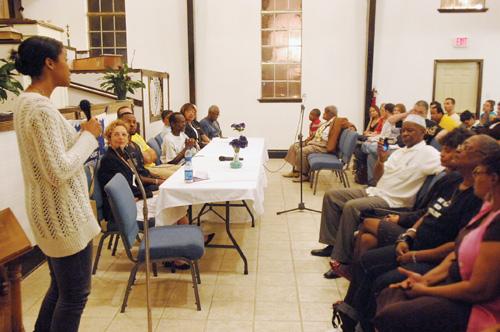Loyola law students aided the United Nations Oct. 30 by serving as legal reporters for a New Orleans town hall meeting, and a United Nations representative will present this information to the UN next March as part of a report on the national housing crisis.
A group of about 20 Loyola students — along with community members and members of housing advocate organizations such as Mayday New Orleans, Unity of Greater New Orleans and C3/Hands Off Iberville — listened to testimonies from residents still suffering the effects of Hurricane Katrina as well as advocates for affordable housing. In addition to testimonies, some offered suggestions to alleviate or eradicate the housing crisis in New Orleans.
Students listened while members of the community affected by the housing crisis shared their stories with the appointed UN Special Rapporteur on Adequate Housing, Raquel Rolink, at St. Bernard Community Church in Mid-City. As part of a seven-city tour approved by the U.S. State Department, Rolnik traveled to New Orleans for a two-day visit to investigate the housing disparities in the metro area. During her stay, Rolink met with city officials, conducted site visits and investigated issues such as the increased homeless population, public housing and the foreclosure crisis.
Cynthia Coulange, a second-year law student who said some day she would like to work for the UN, said she did not think the state of housing would still be an issue four years later.
“We are one of the most powerful countries in the world,” Coulange said. “If we have substandard housing, that’s a huge problem.”
Deborah White, who lived in a St. Bernard housing development before Katrina, now lives in the Iberville housing development and gave a testimony of the conditions in her unit.
“I am living in a mold and mildew house that looks like fungus is growing on the ceiling,” she said.
White, who has been diagnosed with asthma, emphysema and a chronic lung disease called COPD, was told she had to pay $250 because her desire to move from one unit to another was classified as a “convenient move.”
“I’m looking for a ‘necessary move.’ It is necessary,” White said. “What do I have to do, die before they move me?”
Steven Kennedy, a student of urban and regional planning at the University of New Orleans who sat on the panel, said affordable housing should be a right.
“Everyone should spend 30 percent of income on housing, but some are paying 80 percent,” he said.
According to Rolink, viewing adequate housing as a human right “gives a different vision on the housing crisis,” and the crisis becomes a social issue rather than a financial and economic one.
“I expect in a humble way to contribute to this change,” she said.
Charmaine Jackson can be reached at cjackson@loyno.edu






